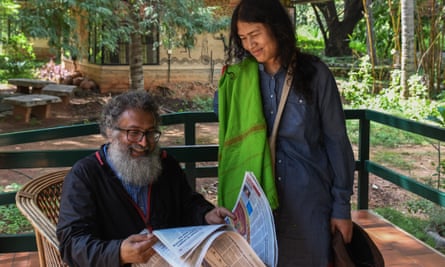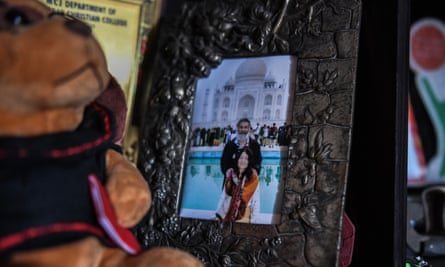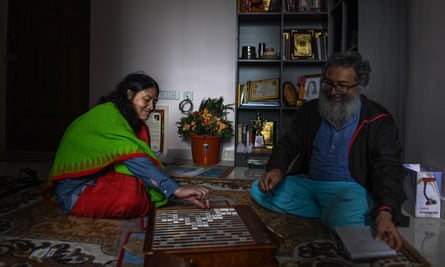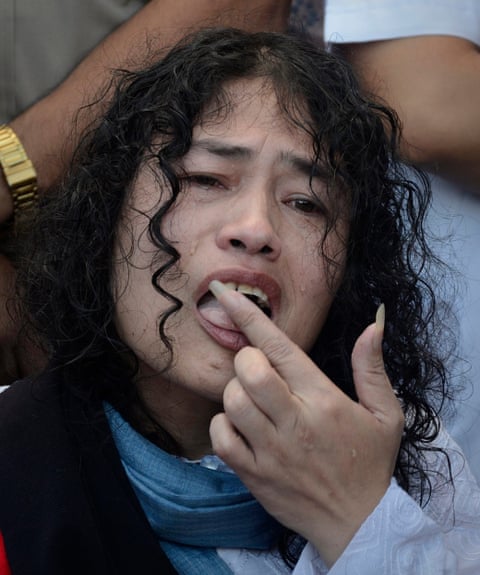Journalists from around the world watched expectantly. Irom Sharmila peered at the smear of honey in her hand. Her face was twisted in anguish. She wept. Then, with a glance at the sky, she scooped a finger of honey on to her tongue.
And that was how it ended. On a cloudy morning in August 2016, in Imphal, the capital of the northeastern Indian state of Manipur, the world’s longest hunger strike was over. Sharmila had eaten for the first time in nearly 16 years.
A martyr had come back to life.
A slight, pale woman with unruly dark hair, Sharmila had last voluntarily eaten on 4 November 2000. That afternoon she had settled by a pond, in a meadow of banyan and bamboo, with two packets of pastries, “filling my stomach to my heart’s content”, she says.
The state around was seething. Manipur, a violent, divided former kingdom on the border with Myanmar, is riven by ethnic and anti-Indian insurgencies. It is one of a handful of Indian states subject to a colonial-era law known as the Armed Forces (Special Powers) Act, or Afspa, which grants virtual immunity from prosecution to Indian military stationed there.
The results are predictable. “It has created a new category of Indian citizens who are killable people, rape-able women,” says Babloo Loitongbam, a human rights activist and lawyer. “We have concrete records of at least 1,528 extrajudicial executions of civilians over the space of 33 years. And this is just the tip of the iceberg.”
Over the 5,574 days she fasted to demand the law be abolished – force-fed through a nasal tube and imprisoned in an Indian government hospital – Sharmila became the face of the struggle against Afspa. She was lavished with international prizes, awarded thousands of dollars and declared a prisoner of conscience by Amnesty International. Her poster adorned homes across the state. “We thought if things went well she could be the first Nobel laureate from Manipur,” Loitongbam says.
Yet now, Sharmila, 46, has become an outcast in her home state. The same activists who praised her as a goddess now call her a prostitute, she says. She has accused them of “acting like the Taliban”.
“She has created a big joke out of herself, which not only destroyed her as a persona, but destroyed our movement, and it has taken us a long time to recover,” Loitongbam says.
With a lick of honey that day in Imphal, she chose to give up sainthood. She was sick of being worshipped. She no longer believed in fasting. Maybe worst of all – in the eyes of many supporters – Sharmila had fallen in love.
On 2 November 2000, a makeshift bomb exploded close to an army convoy passing a bus stop in Malom, in Imphal’s west district. The soldiers claimed the bomb was followed by gunshots and they returned fire. None of the troops was hit – a judge would later decide there was no evidence anyone had shot at them – but when the firing ceased, 10 Manipuri civilians were dead.
Sharmila, then 28, was working as an intern with Loitongbam’s human rights group. She helped to document cases of alleged abuse by Indian soldiers, interviewing women who had survived gang rapes, and the parents and children of slain civilians.
Her family had been poor and she had struggled to finish high school. But she had what she calls a “gift from God”: an overwhelming sense of duty that compelled her to find a way to fight injustice. She learned of the so-called Malom massacre the day after the shootings, when images of the victims’ bloody bodies were printed on the front of newspapers.
“Seeing that, I felt the futility and uselessness of holding another rally, just shouting,” she says. “That was how I decided. I thought people would follow me like Gandhi’s independence struggle. I just felt I wouldn’t die.”
On 5 November, Sharmila sat under a shelter near the site of the killings with a placard, announcing she was fasting until Afspa was repealed. A crowd quickly formed around her.
“Before sunset, people were sitting with me,” she recalls. “But a little later, they all, one after another, excused themselves and left me behind.”

The announcement that one of his interns had stopped eating came as a shock to Loitongbam, a lawyer trained at one of India’s top universities in Delhi. “Honestly, my first suggestion to her was, no, don’t do this,” he recalls. “It’s too big an issue for you to handle. Repealing Afspa is very big. Let’s choose something more strategic.
“But she said no, I’ve got my mother’s blessing – and she jumped into it.”
Even at that stage, Sharmila says, misgivings were creeping into her mind. She recalls observing the crowd in Malom in the first days of the fast. “It was like a street show or a circus,” she says. “They gathered on the road in the thousands – gossiping, laughing, criticising.
“I felt like the people were due to awaken,” she adds. “I would just tolerate until then.”
The first time Sharmila was force-fed was around 10 November 2000, about six days after her last voluntary meal, and soon after she had been arrested and charged with the crime of attempting suicide.
At first she tried to resist the feeding tube. “But I convinced myself it was futile,” she says. “My position was like a bird who had shattered her wings.”
Though the prison manual required force-feeding through the mouth, she persuaded the doctor to use a nasal tube instead. If she was force-fed through her nose, she reasoned, she was holding to her promise not to eat until Afspa was repealed.
And so, several times a day for the next 16 years, Sharmila was kept alive by a mash of nutrients and water pumped through a a three-feet tube between her nose and stomach.
Manipuris were initially baffled, Loitongbam says. “Honestly, at first it was a joke. People asked, how can this girl from the middle of nowhere be doing this? Me, my organisation, her family members worked hard to establish her.”
Indian authorities could detain Sharmila for one year at a time: the length of the penalty for attempting suicide. When the year was up,she would be released, start fasting again, and promptly be rearrested and returned to isolation in her ward at Imphal’s Jawaharlal Nehru hospital.
Outside, Manipur continued to boil. On 10 July 2004, a young woman named Thangjam Manorama was dragged from her home by Indian soldiers. “Mother, mother, please stop them,” her family say she screamed as she was taken away.
A judicial inquiry later found that Manorama was tortured and her body dumped near a police station with 16 bullet wounds. Nobody was charged; the soldiers invoked Afspa.
Outrage after the murder paralysed Manipur for months and turned Sharmila into a hero. “The fact she had continued fasting for four years hit the psyche of the people,” Loitongbam says. “From 2004 onwards, she was a leader. She became the symbol – for better or worse – of the Manipur resistance.”
In her guarded ward, Sharmila occupied herself with passing the endless time alone. She wrote poetry. She rose in the middle of the night to walk in circles in the corridors. She held yoga positions for hours.
She fought the maddening dryness of her mouth – having also eschewed water – by sucking cotton balls to keep saliva flowing.
“I really loved life,” she says. “Just because of that love, those long years of endurance were possible.”

She awaited the day Manipuris would be inspired by her strike to organise, shed their divisions and force the government to repeal the military special powers act. Then she could get on with a normal existence.
“This kind of living with nasal feeding, just observing day and night and getting all that blind fame – I just knew this was not life,” she says.
Yet as her aura grew, Sharmila felt like this goal was becoming more distant. “People just started praising my glory without listening to what I wanted from them,” she says.
“That prolonged sense of responsibility and commitment was left to me alone. It needed to be a collective cause, a mass cause.
“I was isolated and idolised, living on a pedestal, without voice, without feeling,” she says.
At the peak of her powers, Sharmila was being sought out by Nobel laureates and diplomats. She was called the Iron Lady of Manipur. She was miserable.
Early in 2007, a British-Indian named Desmond Coutinho arrived in the country. His mother had just died from cancer, and the west Londoner was questioning his life. “I was always half-training to do something but never got anywhere,” he says.
So a friend suggested Coutinho, now 55, follow in the footsteps of generations of listless westerners and go to India to find himself.
“He said, for the first time in your life, Dessie, you won’t feel out of place, because you won’t be the shortest person there and you’ll be the same colour as everyone else.”
He eventually settled in the south Indian city of Bangalore, where one morning, he saw a newspaper story about a hunger striker in Manipur.
“I remember seeing this tiny woman on the bed,” Coutinho says. “I thought of the way my mother died. He says: “The story sounded horrific, and at the end she said she liked reading books, but she wasn’t always given some.”
So Coutinho started sending her letters, along with two books. About three months later, Sharmila replied. “It was a bit of a stroppy letter,” he recalls. Sharmila was keener to interrogate the crimes of imperial Britain than to flirt. “She wrote, ‘It’s all well and good to admire me, Mr Coutinho, but why is it right to send your mercenaries throughout the world?’”
He recalls: “I replied saying, whoa – I personally do not send any mercenaries anywhere.”
Over the next months they kept exchanging letters, and Coutinho kept sending her books. She liked PG Wodehouse. She disliked a book of essays about postmodernist economics. (“I toned down my choices,” Coutinho says.) Her favourite was a biography of Ingrid Betancourt, the French-Colombian activist held hostage by guerrillas for six years.
Coutinho was smitten by Sharmila, and sizing up the hurdle before him: how to signal to a woman he had never met – a woman engaged in the world’s longest hunger strike – that he was keen to start a relationship.

Sharmila finally made the move. “She wrote a very sweet letter, saying please forgive me if I’ve misunderstood, and if I’m wrong, please don’t hurt me,” he says. “I went to one of the local stores and looked for the biggest Valentine’s card I could find. Something over the top, so there could be no misunderstanding.”
Sharmila reminded him she was not free. Did he want this commitment? A relationship with a prisoner, isolated in a hospital ward?
“So I said in return, I will no longer be free,” he says. “I will not write to anyone but you.”
“To me, the problem started when Coutinho walked into her life,” says Loitongbam. “Manipuri society is traditional, and there is a certain way courtship should take place.”
Coutinho’s arrival in Manipur in 2011 shook up the anti-Afspa movement. The group of activist mothers who had surrounded Sharmila strenuously objected to the partnership. So did members of her own family.
For Sharmila, the reactions fuelled a sense of resentment towards the campaigners around her. “Even though I was on a hunger strike, I still cherished family life, living with a life partner. My inner being was dreaming of these things.”
She continued her annual cycle of release, starvation and arrest, but her doubts were growing, and she prayed for guidance. “Always I was complaining to God: ‘Are you not finished experimenting with me? Is it not enough yet?’” she says.
In July 2016 she shocked the country and her supporters by abruptly announcing an end date to her fast. “Nothing had changed in people’s mindsets after 16 years,” she says. “I really wanted to change myself, the environment, the tactics, everything.”
Instead, Sharmila said, she would marry Coutinho and continue her struggle by running for Manipur’s parliament.
To Loitongbam, the plan was hopelessly naive. Democracy in India can be grubby; most citizens still vote along caste or religious lines, and votes are brazenly traded for money or gifts. It is no place for saints.
“I told her, Sharmila, you are like uranium, you have enormous spiritual power,” he says. “But just as you need technology to convert his uranium into atomic energy, you need a whole infrastructure behind you. Without it you cannot convert spiritual energy into political power. But she just didn’t listen.”
The activist mothers around Sharmila were incensed by her decision. “In their imaginations I had already been sacrificed,” Sharmila says.
“They said I wanted to leave to get married, get a husband; that I was a whore.”
One Manipuri militant group issued a statement warning Sharmila “some former revolutionary leaders were assassinated” after deviating from a radical path.
Nobody offered to take her in: she spent her first weeks of freedom in the same hospital ward she had been imprisoned inside for more than a decade and a half.
The election, held in March 2017, was a disaster. Sharmila ran against the state’s most prominent politician. She won 90 votes. Two days after the result was announced, she boarded a flight out of Manipur.
Today, Sharmila lives in an apartment on the outskirts of Bangalore. She and Coutinho recently celebrated their first wedding anniversary. They went to the Taj Mahal. A picture of the pair is framed in their home, near a shelf of awards that Sharmila has accumulated, and a rare statue of a starving Buddha.
Eating again is a pleasure, she says. Everything is tastier since the fast. “That first drop of honey was bitter, so caustic,” she recalls. “The taste spread throughout my whole body.”
Hours later, beyond the glare of the cameras, she tried to drink an ounce of coconut juice – and immediately threw it up. It took her months to hold down a full meal.
Sharmila has never returned to Manipur. She is unsure if she would be welcome. I ask if she is finally at peace. “I think so,” she says. “No more bondage, controlling by others all the time. That sense of freedom, my own view, reaching out to the farthest point.”
“What else could we have done?” Loitongbam says ruefully. “The only service we could do was to build her image higher and push for the repeal of Afspa.
“Our mistake was that we eulogised her so much,” he concludes. “She didn’t want to be a god. She wanted to be a human.”
Life of struggle
1972 Born Imphal, India.
October 2000 Joins Human Rights Alert as an intern.
November 2000 Begins a hunger strike to protest against the Malom massacre, in which 10 civilians were shot dead by a paramilitary unit while waiting at a bus stop.
2007 Awarded the South Korean Gwangju prize for human rights.
2009 Awarded the first Mayilamma award for her “non-violent struggle in Manipur”.
2010 Wins a lifetime achievement award from the Asian Human Rights Commission, followed by the Rabindranath Tagore peace prize from the Indian Institute of Planning and Management.
2011 The Save Sharmila Solidarity Campaign is launched.
2013 Amnesty International declares her a prisoner of conscience.
August 2016 Ends her 16-year fast and announces she will stand in Manipur’s state elections. She launches a political party, Peoples’ Resurgence and Justice Alliance.
2017 Her party contests two constituencies but Sharmila receives the fewest votes.
